PALIMBANG, Sultan Kudarat (MindaNews / 27 April) – This Moro-dominated town is starting to rise from notoriety and obscurity, luring visitors with the slogan “Manisan ka Palimbang.”
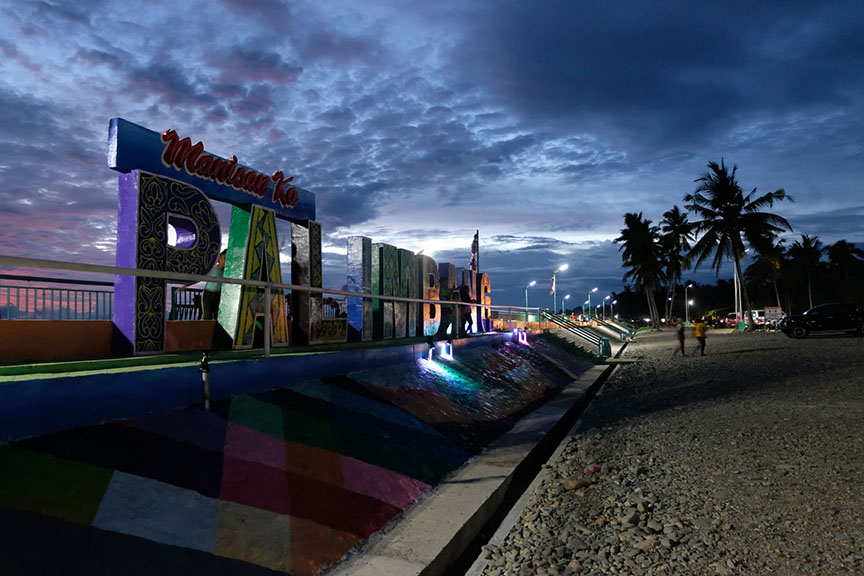 The newly constructed baywalk in Barangay Baranayan has become a popular evening promenade among locals. Just along the national highway, the baywalk is a vantage point for sunset viewing. MindaNews photo by BONG S. SARMIENTO
The newly constructed baywalk in Barangay Baranayan has become a popular evening promenade among locals. Just along the national highway, the baywalk is a vantage point for sunset viewing. MindaNews photo by BONG S. SARMIENTO
The Maguindanawon phrase is conspicuously engraved at the newly constructed 259-meter baywalk beside the highway in Barangay Baranayan, just across the site of the future municipal government complex.
It means “Palimbang is beautiful.”
But for decades, the beauty of Palimbang, which is about three hours away from General Santos City by car, has been denied to outsiders, no thanks to the ghastly past that haunted this coastal town and its people.
A stronghold of the Moro National Liberation Front in the 1970s, Palimbang, founded on August 14, 1959, was the scene of one of the most horrifying moments in Bangsamoro history after 1,500 male Muslim residents were reportedly killed by government troops in what was infamously known as the Malisbong Massacre, according to studies and testimonies of survivors.
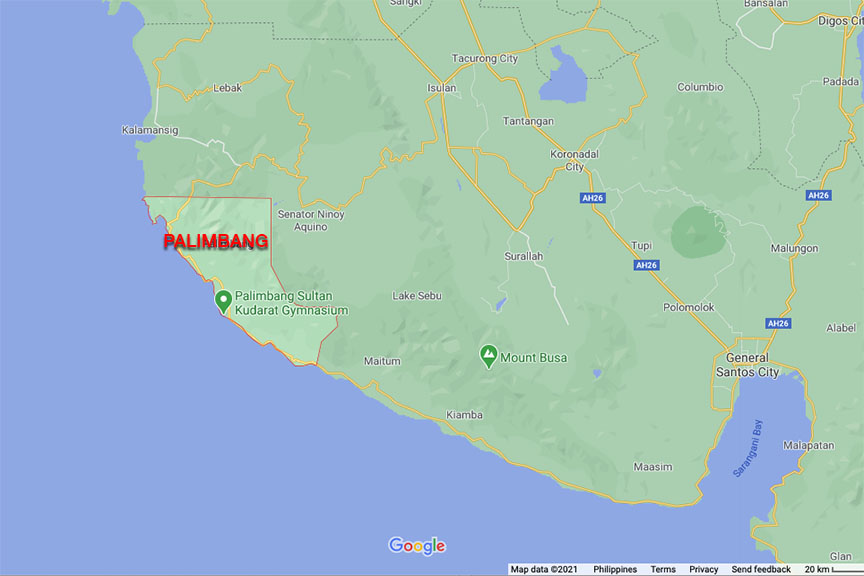 Palimbang, Sultan Kudarat. Map courtesy of Google
Palimbang, Sultan Kudarat. Map courtesy of Google
Some were killed inside the village mosque while the others were shot at the graves they were ordered to dig along the coastlines. The village women, along with the children, were herded into a ship, where government forces allegedly raped many of them.
For decades, the second-class town, with a population of 94,000, was also notorious for its deadly rido or clan war where rival families shot at each other even in broad daylight, prompting constant evacuations.
Things, however, have changed for the better since the past two years, with signs of progress emerging even right at the entrance of the municipality, which borders the town of Maitum in Sarangani province.
Upon entering Barangay Malisbong where the 1974 massacre occurred, a Moro heritage-inspired P2-million landmark archway was recently completed to welcome tourists.
Going towards the town proper, the open blue waters of Moro Gulf within the vast Celebes Sea is a sight to behold, with the baywalk just ahead not to be missed for a picturesque travel photo opportunity.
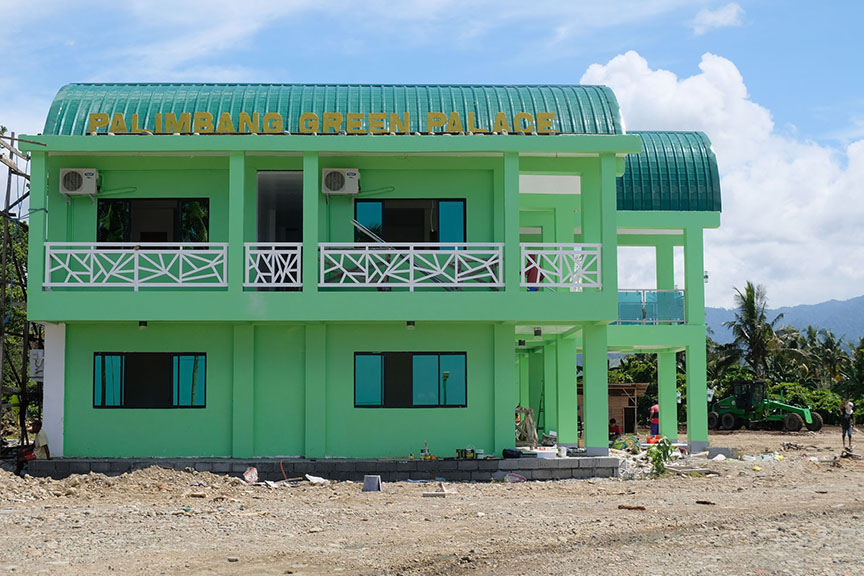 The P10-million Palimbang Green Palace is slated to be opened soon for visitors who want to stay for a night or two in Palimbang. MindaNews photo by BONG S. SARMIENTO
The P10-million Palimbang Green Palace is slated to be opened soon for visitors who want to stay for a night or two in Palimbang. MindaNews photo by BONG S. SARMIENTO
Opposite the baywalk is the P10-million Palimbang Green Palace, an edifice reflective of peace, progress and prosperity that the municipality is now experiencing after decades of underdevelopment due to alleged government neglect and the volatile peace and order situation.
Businesses, such as hardware and merchandise stores, are mushrooming now that locals no longer need to go to neighboring Maitum town to buy essential stuff.
Mayor Joenime Kapina attributed the town’s progressive momentum to the relatively stable peace and order condition in the last two years due to the changing mindset of his constituents: from rebellion- to development-minded.
“Before, when 5 p.m. strikes, you will seldom see people in the streets due to the fear sown by lawless elements,” he told MindaNews.
But now, the well-lighted baywalk that was opened to the public recently has become a magnet that is drawing locals outside of their homes even at night simply to laze around and enjoy the sea breeze.
Video by Zaki Sarmiento
To add to the lively atmosphere, the local government allowed carnival rides and food stalls to operate just across the baywalk.
Local tourists have been coming into the town mostly through word of mouth, from family or friends who have been here.
“Our place is generally safe and peaceful now. That’s a big leap from before when our place is feared due to lawlessness and chaos,” the mayor said.
In response to the growing local tourist arrival, the municipal government constructed the two-story Palimbang Green Palace, the only “high-rise” concrete public building ever in the locality, to accommodate visitors who want to stay overnight. The town’s guesthouse could conveniently accommodate at least 40 people at one time.
Essentially, tourists visit this town to frolic on its still relatively unspoiled beaches and the natural islands that are very close to the shorelines, an attraction that is so far known only to exist in this town in the entire Soccsksargen or Region 12.
About 30 minutes away north from the town center is the Medol Islet Beach in Barangay Medol.
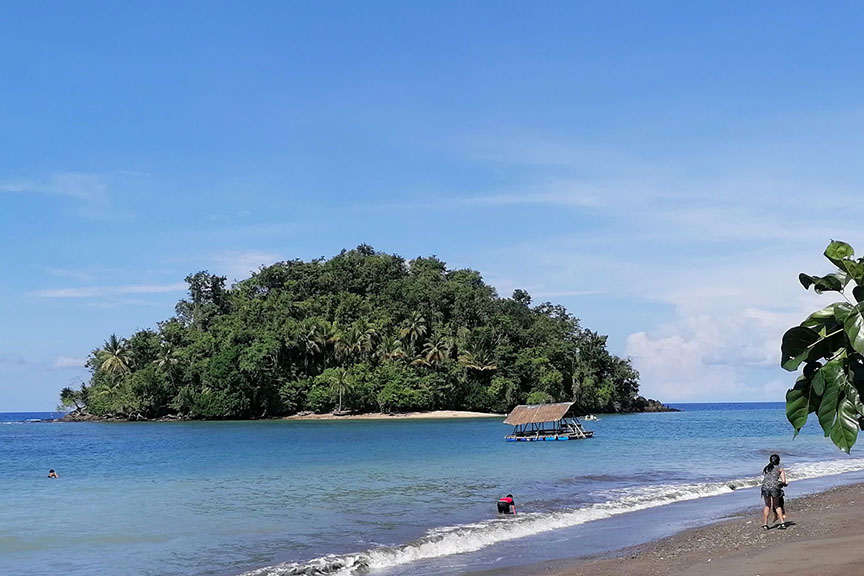 Medol Islet beckons from the shorelines of Medol beach, presently the most visited resort in Palimbang. MindaNews photo by BONG S. SARMIENTO
Medol Islet beckons from the shorelines of Medol beach, presently the most visited resort in Palimbang. MindaNews photo by BONG S. SARMIENTO
With the islet looming big from the shoreline, tourists can enjoy the sand, sea and sun at dirt-cheap rates.
Entrance fee is only P10. The open cottage costs just P200 while the floating one is only P500 per day. For an overnight stay, there are a few A-shaped closed cottages made of light materials that can be rented for P500 each. It can accommodate a family of four.
When at Medol beach, don’t miss going to the islet, with motorized bancas ready to bring tourists for only P20 / head round trip. It takes less than five minutes to cross the water. At the islet with its sandy white shorelines, visitors can swim at its turquoise waters, snorkel or go hook-and-line fishing.
A few kilometers down the road from Medol Islet Beach is the Maganao Beach Resort, which boasts of its twin islands that are just a stone’s throw from the shorelines.
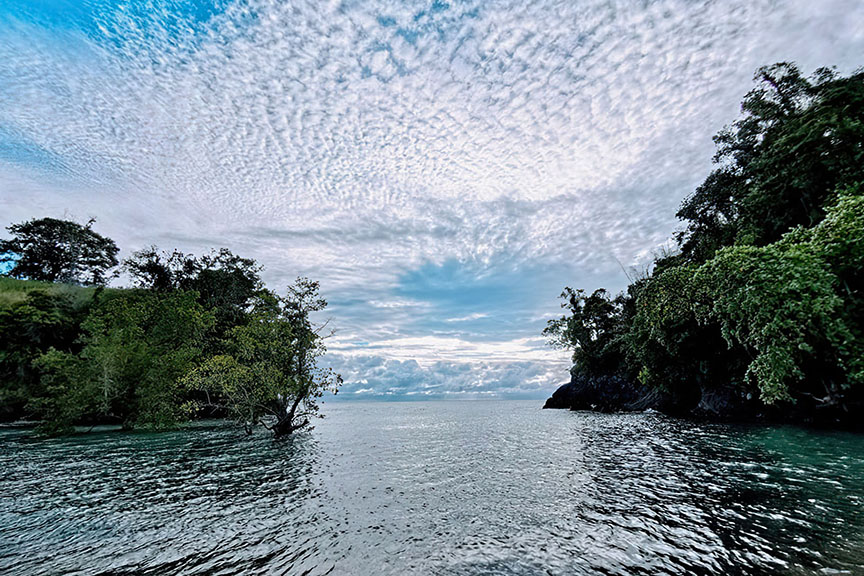 Palimbang’s twin islands are a stone’s throw away from Magalong Beach Resort and are easily accessible during low tide. MindaNews photo by BONG S. SARMIENTO
Palimbang’s twin islands are a stone’s throw away from Magalong Beach Resort and are easily accessible during low tide. MindaNews photo by BONG S. SARMIENTO
Trekking is allowed at the twin islands. At the peak, the vast Celebes Sea provides a fascinating view.
Maganao Beach is still basically pristine, save for the few open cottages that can be rented at P200 per day for visitors to stay. There’s a Spartan toilet and bath rooms with fresh water supply.
Abdul Kadil Masil, the resort manager, said they are developing the resort to be affordable for the masses.
For now, pitching a tent for an overnight stay is highly recommended to protect visitors from the elements.
“Our place is peaceful and safer compared to decades ago because the feuding families have reconciled,” Masil told MindaNews.
About an hour away from the shorelines by pump boat, the Balasan Sandbar beckons. Corals and fishes of different varieties and sizes thrive in the vicinity.
The sandbar can be accessed from the fishing village of Milbuk, which is located south of the town center and mostly populated by Christians. An outrigger that can carry 20 persons can be rented from P1,500 to P2,000, depending on one’s bargaining skills, to go to the sandbar.
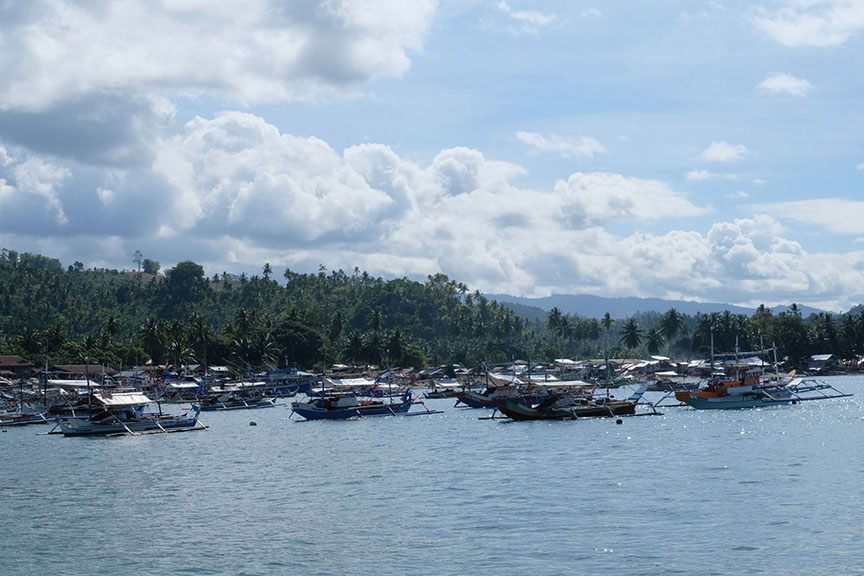 The fishing village of Milbuk is home to the town’s Christian population. MindaNews photo by BONG S. SARMIENTO
The fishing village of Milbuk is home to the town’s Christian population. MindaNews photo by BONG S. SARMIENTO
Beside the beaches, the town has another natural treasure – the Sampaw B’leg waterfalls in Barangay Namat. It takes 45 minutes on a habal-habal (motorcycle) to reach the village and another one hour of uphill climb to get to the falls.
In visiting the town’s swimming attractions, it is better for tourists to bring their own food, as even small eateries remain scant in these places. However, the Coastline Food Hub along the shorelines of Barangay Malisbong is standing out for its delicious and affordable meal and snack foods, attracting locals and visitors alike.
For those without private vehicles, passenger vans ply daily to and from GenSan, with the ride costing P500 per head. The fare used to be P250 / head but operators doubled it due to the COVID-19 pandemic that forced them to reduce their passenger load by half.
For business travellers, EJ Transient House offers a homey Filipino atmosphere with its bahay-kubo quarters neatly arranged in a garden.
Joanne Zoe Egonia, Palimbang acting tourism officer, said they are anticipating more tourist arrivals with the peace and progress that the town is experiencing.
 Father and son enjoy hook-and-line fishing at the Medol Islet. MindaNews photo by BONG S. SARMIENTO
Father and son enjoy hook-and-line fishing at the Medol Islet. MindaNews photo by BONG S. SARMIENTO
“We are still mapping our other natural tourism spots,” she told MindaNews. “We are steadily laying the groundwork for our tourism industry to avoid being overwhelmed by the foreseen influx of tourists in the years ahead.”
For locally made pasalubong items, drop by at the souvenir shop operated by the women-run Palimbang Entrepreneurs and Agrarian Reform Beneficiaries Cooperative along the roadside of Barangay Barongis. They sell hand and shoulder bags and handicrafts made of indigenous local materials, banana chips, rice coffee, vinegar and fermented fish sauce (bagoong), among others. (Bong S. Sarmiento / MindaNews)
